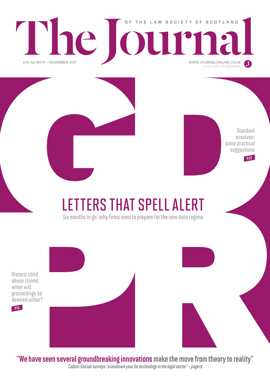Opinion: Claire McKee

We all now know about the Harvey Weinstein allegations and his subsequent demise in an industry not usually known for its condemnation of misogynistic views and behaviour towards women. Claims of similar behaviour in all walks of life have abounded, with the #Metoo campaign gaining traction in all sectors from politics and journalism to advertising and science. What about our respected profession?
Professionally I have not had cause to advise in such cases in an employment sphere. Even anecdotally, sexual abuse or harassment of the sort alleged is largely not on my radar amongst lawyers. Is this because it doesn’t happen? I fear not.
Having attended my fair share of black tie dinners and the like, I can well imagine a situation whereby senior male lawyers or “VIP clients” make inappropriate comments to young female trainees or NQs (often drafted in at the last minute to bump up the numbers), who might feel too intimidated to complain. There is a power imbalance which may be taken advantage of. I very much doubt that young lawyers, or in some circumstances lawyers many years qualified, would feel they were able to risk their own reputation (unbelievably) and/or career by complaining. My concern is that anyone put in this situation is more than likely to write off such conduct as something that happens on occasion and just to be put up with.
Is there sufficient protection if someone in this situation did want to complain? If a solicitor wanted to make such a complaint against another solicitor he/she would first be advised, if consulting the Scottish Legal Complaints Commission website, to complete the online form. The website suggests this should only be done after having complained to the practitioner/firm concerned and allowed at least 28 days for a response. The “example total time” for a complaint to make its way through the process is 16 months.
The response to an ad hoc query to the SLCC helpline suggested that a complaint to the individual concerned “probably wouldn’t be appropriate”, and that if the conduct was deemed serious enough it would be referred to the Law Society of Scotland who would decide whether to take the matter to the Discipline Tribunal.
I sought out the SSDT annual reports from 2011-12 to 2015-16. In 2015-16 there were 32 complaints of professional misconduct. None of these relate to sexual abuse, nor is there a heading for such in the report. Would it simply be labelled “other conduct unbecoming a solicitor”? I suggest it should be separately recognised.
The Tribunal did consider a case in 2014-15 where a solicitor entered into a sexual relationship with a vulnerable client. This was considered under the category of conflict of interest. The Tribunal found that “the respondent should have known better and committed a serious error of judgment by continuing to act”. Over the last five annual reports this was the only reference I found to any form of sexual abuse or harassment.
Over that time the chairman of the SSDT has been male. Currently its 24 solicitor and non-solicitor members are two-thirds male. This is not representative of the modern profession. In my view it should be.
The other alternative for anyone sexually abused or harassed is of course the police and criminal justice system. I think for this audience I need not set out the reasons why this may not be an attractive option.
It was after watching an interview with Hillary Clinton that I decided to accept the invitation to write this column, though my first thoughts had involved running great distances the other way. In her own words: “Don’t let anyone tell you that your voice is not powerful and valuable… if we are going to try to reach the kind of equal rights and treatment that we should be aiming for.”
Please let us lawyers lead by example. Partners and senior lawyers, in particular in my view, have the responsibility to call such unacceptable behaviour out and ensure that they do not allow any culture where it is tolerated. For some this will involve a shift in standards, policy and/or attitude. This shift is required in order that we provide an appropriate channel for complaint for victims of abuse or harassment and to ensure that any Harvey Weinstein-type figures in our profession become a thing of the past.
In this issue
- Immigration detention: a case of overuse
- Sexual harassment: don't suffer in silence
- Child disputes: a quicker way through?
- Brexit: where are we now and what happens next?
- Reading for pleasure
- Opinion: Claire McKee
- Book reviews
- Profile
- President's column
- ScotLIS: the citizens' tool
- People on the move
- People matter
- Historic abuse: the fairness matrix
- Landmark year in legal IT
- Sentence, but no full stop
- Opening up arbitration
- Making the agent pay
- Equal pay: beware the mass claims
- Dealing with conflict
- Claims outside the rules
- Pension transfers – history repeating itself?
- Last instructions
- Scottish Solicitors' Discipline Tribunal
- Standard missives: an unachievable dream?
- SOLAR powered
- Disability rights
- Law reform roundup
- Too hard a drive?
- Settlement: can you avoid cheques?
- Q & A corner
- When 25 is the new 35
- Sorry; not sorry
- Ask Ash
- Plan sets ambitious 2017-18 targets
- Letting agents: prepare to register
- Paralegal pointers
- A way to make an impact






